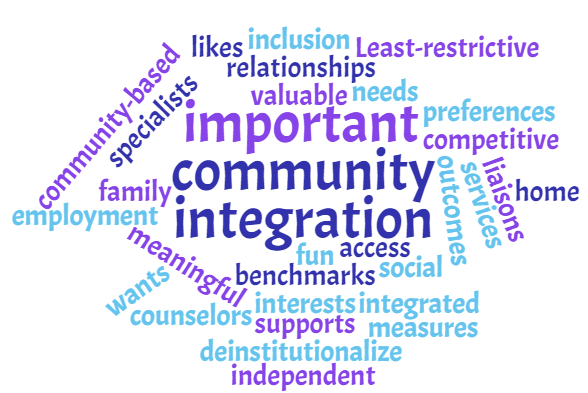3 Surefire Ways to Fail at Community Integration and What to Do Instead

People with disabilities and their families fought long and hard for the right to leave institutional life behind in order to live, work, and play in concert with their fellow citizens.
As a system, we got on board. We secured all the words and phrases…least restrictive, community integration, community based, competitive community employment, etc.

We created integration specialists, counselors, and liaisons, and we developed measures. Lots of measures.
A quick Google search on the term Community Integration produces 533,000,000 results.
Holy cow!
Now you’d think, given our devotion, dedication, and expertise to the topic, that people with disabilities would experience integration to their hearts’ content.
You’d be wrong.
As a system we still struggle with the idea of community integration as a meaningful and sustained experience for people with developmental disabilities. Let’s look at why.
We Fail to Start with Interests
It’s not that we ignore interests, it’s that we fail to develop interests. If someone likes pizza, we order pizza. If someone likes bowling, we take them bowling. If someone likes horses, we buy horse posters. And then we repeat. We go no further.
We are satisfied when we support a few things that we know someone likes. And we indeed should support the things someone likes. But that…is not enough.
Those we serve depend on us to help them really dig into their interests, and expand their frame of reference.
For that person who likes pizza…do they know where pizza comes from? How about the different styles of pizza, what pizza looks like in other countries, or the nutritional content of pizza?
Do they know the different kinds of toppings? Have they tried to make pizza, visited a pizza shop and spoken with the owner? Have they tried to make sauce from scratch, watched videos on how to make pizza, looked at books about the countries that have pizza, or tried to grow some food that is served on pizza?
For the person who likes horses…have they talked to horse owners, tried cleaning stalls, ridden, learned about the parts of a horse, been to a show, race, or competition?
Have they learned about the history, or the clothing of riders? How are horses used and viewed around the world? What kind of equipment is used on a horse and why? Would they like to understand how Native Americans interact with horses without all that equipment?
Have they painted or drawn horses, contributed to horse rescue efforts, or joined horse organizations?
We all dive into our personal interests. Learning, connecting and reflecting over time. We must support people with disabilities to do the same, and to use their interests as a spring board to connect with like-minded fellow citizens.
We Fail to Reflect
“We do not learn from experience…we learn from reflecting on experience.” ~John Dewey
Reflection is an ongoing process. We constantly run our experiences through our minds, examining, analyzing, pondering, and evaluating what we liked, didn’t like, should have done or will do differently.
We want to figure out how to repeat positive experiences with more heightened enjoyment while honing the experience to eliminate or lessen any unpleasant or undesirable elements.
Through reflection we facilitate the evolution of our interests, our character, our knowledge, our growth, and our fun!
For those we serve, it is our job to be Reflection Facilitators. We must help those we serve to implement the Scientific Method. To learn, through trial and error, collect and analyze data, and challenge results through repetition and changing variables in order to extract as much experiential richness as humanly possible.
What did they like, not like, and why? What should be changed for the next time? How can the experience be enhanced? How can more senses be activated? Who else can participate? What is next step in digging into the topic further?
And we need to facilitate these conversations during the experience, after the experience, and after some time has passed to see if any responses or feelings have changed.
Of course, we must record the thoughts, insights, and new goals; and even help the person to record their thoughts, insights, and new goals. The process is continuous, even if the interests change.
We Fail to Create Structure
We aren’t very formal when it comes to planning meaningful integrated activities, and I often hear staff say,
“We do the same things over and over.”
“We can’t think of anything new.”
“There aren’t a lot of things that can be done during the day on weekdays.”
“Staff tend to offer activities the staff are interested in.”
There is sometimes resistance to planning and scheduling because that is “too institutional”. Yet, the world's most successful people talk about how consistency, structure, and planning are the keys to their success.
So, how do we maximize success and avoid an institutional approach?
We find natural times to interject planning conversations such as mealtime conversations, Sunday afternoons/evenings, while connecting with others who have the same interests.
Because the activities are meaningful and fun, there is excitement around making long and short-term plans, pulling together supply lists, creating budgets, deciding where to go, who to invite, and what kind of conversations to have when meeting new people and creating new relationships.
Of course, there will be days that someone just isn’t feeling an activity. No problem! Just rearrange the schedule. When topics are written down, they are super easy to rearrange.
As we empower people with disabilities to have a life of rich and interesting experiences, we must also teach the underlying processes that we know facilitate a successful and fulfilling life.

Join my newsletter and get the
🚀 "5 Power Moves That Will Make or Break Your Provider Success"
for free!





